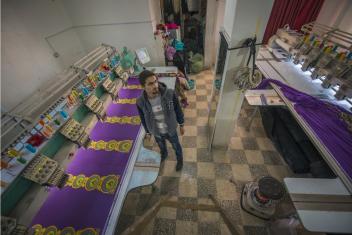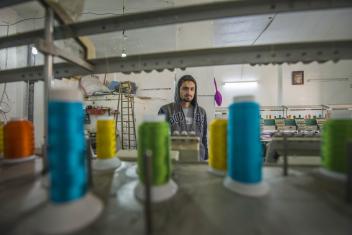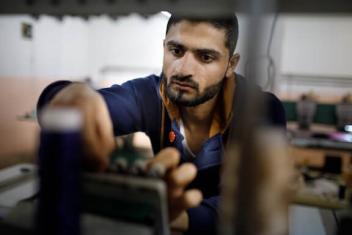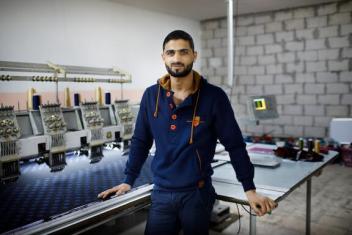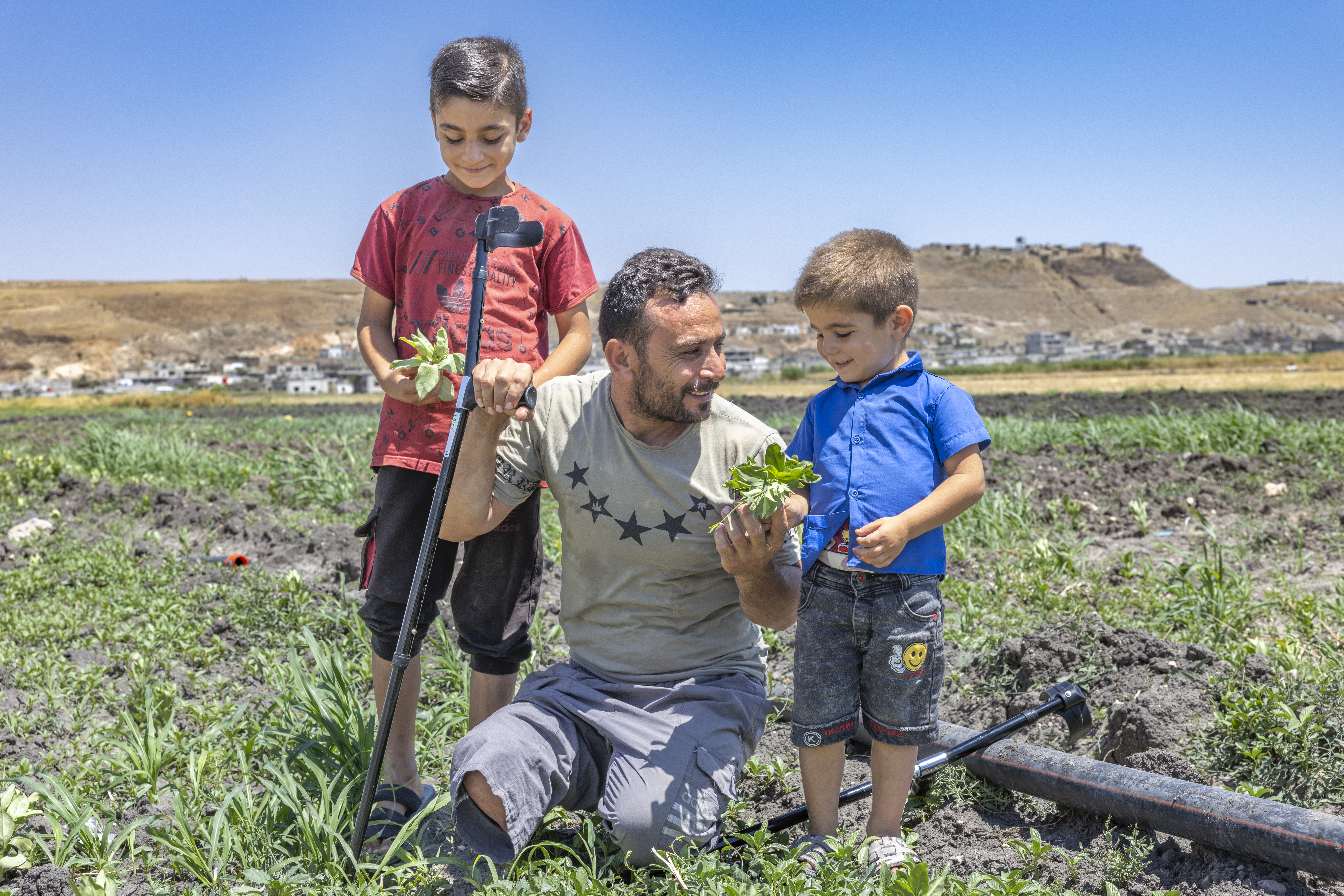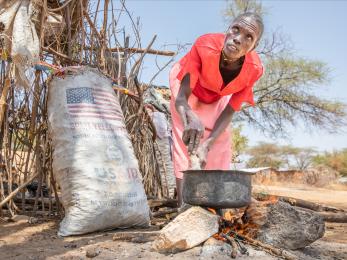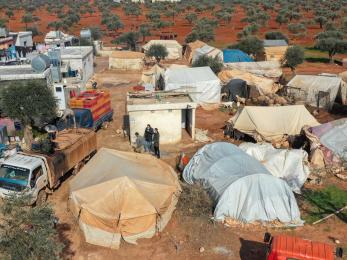The dream Bashar carries
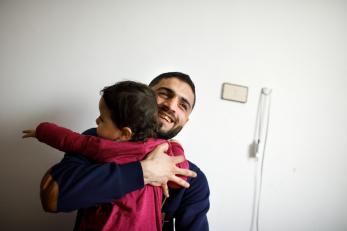
This story is part of our special series, 7 for 7: Seven voices for seven years of the Syria crisis. View the complete series here ▸
Bashar Anwar Abu Khoshref, a 21-year-old Syrian refugee, spends half his life toiling in a textile factory, counting down the days until the war ends.
After fleeing his hometown of Daraa, Bashar gave up his studies in his final year of high school to support his widowed mother and three younger brothers and sisters. Together, they are among the millions of Syrian children and adolescents whose youth has been cut short by the Syrian war, which is grinding into its seventh year this month.
Mercy Corps first met Bashar two years ago, when he was a teenager marking out his passage to adulthood within the walls of a small factory in northern Jordan. He was filled with energy and possibility, waiting for the chance to return home to Daraa.
“If I returned to Syria now, I would be delightful and overjoyed,” he said in 2016. “I would rebuild my country, help people, resume my studies, rebuild our destroyed house, and live my old life again.”
But now, as he spools thread through an industrial embroidery machine, that enthusiasm has been replaced by a tired frustration.
“I am losing my youth at the factory while I dream,” he says. “It is a really hard feeling when you have been out of your country for the last four years, and you have done nothing. You are just working — and for yourself, you have done nothing at all.
“But I never lose that hope. Even after 10 years, I will go ahead and complete my studies,” he says.
The last two years have been a drudgery for Bashar. He still works 12-hour shifts at the factory, which is staffed by Syrians, still earns $430 a month, about 40 percent less than he says a Jordanian would doing the same job. Without a work permit, Syrians cannot seek equal pay for their work.
“Usually no one will accept working 12-hour days, but the Syrians will because they have to,” he says.
Most of Bashar’s earnings go to rent and utilities at his crowded house, and the small amount left over offsets his 14-year-old sister’s school expenses; she was able to resume her education after missing two years when the family first reached Jordan. His younger brother left school three years ago to begin working at a restaurant at 15. Another brother is studying in Canada.
Bashar runs heavy machinery at the factory six days a week, which has taken a toll on his back. The embroidery machine’s 24 needles, which produce traditional stitchwork for women’s clothing, have punctured his hands more times than he can remember.
“It’s a tiring job. It’s not what I want to do,” he says. “It’s also a bit dangerous.”
Yet Bashar is grateful for the work and a sympathetic boss, aware that other refugees in Jordan are forced to hold more grueling jobs in construction or car maintenance. One in 10 Syrian refugee children is working, according to UNICEF, some of them as young as 5. They labor in factories and farms, missing out on school and carrying the emotional wounds of war without the right support to help them heal.
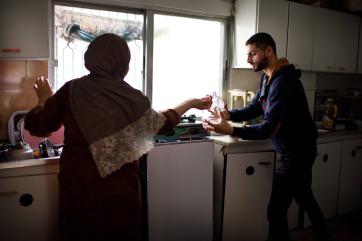
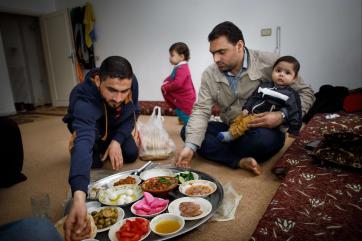
Bashar’s dream is to become a computer programmer, and on his day off he rests and works on his old laptop, which he has used to teach himself Photoshop and filmmaking software. Once a month, he goes to a cafe with friends, most of them Syrians from his hometown.
Bashar also has a handful of Jordanian friends he met through Mercy Corps’ wilderness therapy program, which brings young Syrians and Jordanians together through activities like hiking and rock climbing and pairs them with mentors who teach them relaxation techniques that help them focus on their future.
“I was 100 percent desperate,” Bashar says. “I went from desperation to hope. It changed me a lot.”
The program inspired Bashar to begin volunteering at a Mercy Corps community center, where children in grades four to six learn Arabic grammar and basic English. “I still do that whenever I get the chance, because I like to engage with the community,” he says.
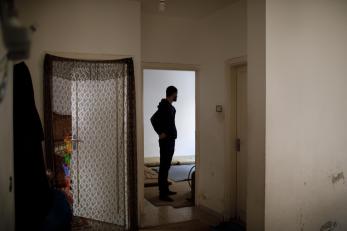
Today, Bashar ignores news about the war. He’s too heartbroken to look at video and pictures of the neighborhood where he grew up, which has been levelled.
“I don’t have a future there. It is destroyed now. I just can’t think about living back there,” he says. “We never thought the war was going to last for this long. We always had hope that we would go back to our country, and we would continue our normal life, but we do not have that hope anymore.”
Though his generation of Syrians is a generation in exile, Bashar hasn’t let go of the dream he originally carried with him across the border into Jordan: that those who do find a way to finish their education, whether in Jordan, in Europe, or beyond, will be the ones who stitch Syria back together when the violence finally subsides.
“My generation lost the most in the war. We lost our future, our studies, everything. But I still believe there is hope in the youth,” he says. “We have been living as Syrians forever, and one day we will be back and live in peace.”
This story is part of our special series, 7 for 7: Seven voices for seven years of the Syria crisis. View the complete series here ▸
